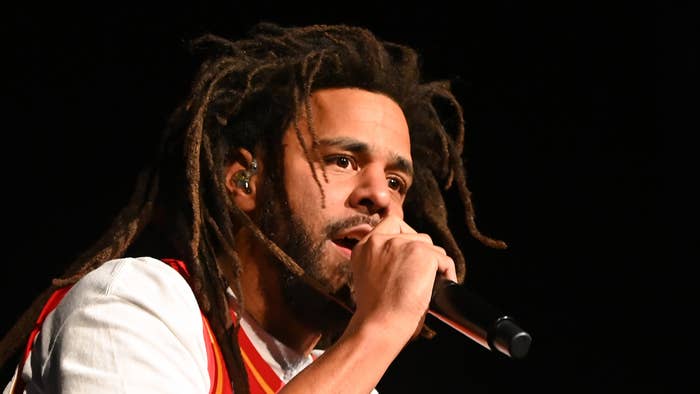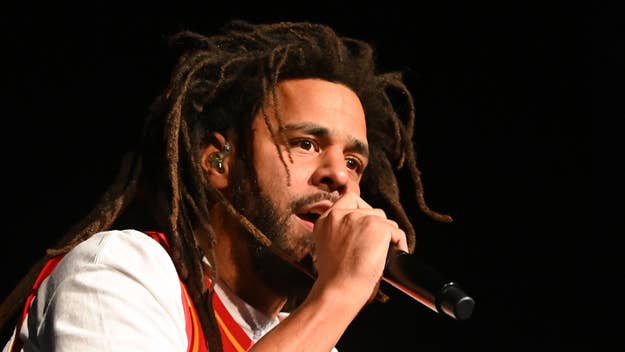
Words by John Kennedy
—
Last night, J. Cole did the unthinkable. But knowing the way he’s moved for the past decade, should we really be surprised?
In the closing performance of his Dreamville Festival in Raleigh, N.C., Cole renounced a days-old “7 Minute Drill” diss track to Kendrick Lamar and expressed regret for disingenuously succumbing to public and private pressure to respond to the Compton MC’s jabs on Future and Metro Boomin’s “Like That.” He even went so far as to call it “the lamest shit I did in my fuckin’ life.”
Hip-hop has rarely seen such a brief and anticlimactic clash of this magnitude, which has put the meme machine and hot-take spin cycle into overdrive. After hearing the surprisingly complimentary “7 Minute Drill,” which was criticized by some as the nicest diss song of all time, Joe Budden suggested that, word to De La Soul, the stakes were too high for Cole. Others questioned whether his song made its intended impact or if he was scared of Kendrick’s retort. Regardless of whether you applaud or spurn the 39-year-old rapper’s move, the truth is, this feud was never Cole’s path to take. And that reality is only underscored by his life and rhymes up until this point.
Ten years ago, in the aftermath of Kendrick’s ground-shaking challenge to his peers on Big Sean’s 2013 “Control,” Cole decided he would do rap stardom differently. His third studio album, 2014 Forest Hills Drive, replaced a previous thirst for validation with contentment (see “Love Yourz,” where he recognizes comparison as a killer of joy). He also became more peaceful. On that project’s closer, “Note to Self,” Cole namechecks Drake, Wale, and, yes, Kendrick, insisting, “We gotta be the example, we gotta show these niggas, man. It's love at the top.” On “Fire Squad,” he adds, “Ain’t gon’ be no more kings,” evoking imagery of destroying the proverbial rap crown like Frodo completing his Mordor mission.
This self-awareness and ego-shedding became a consistent thread in Cole’s work: He preaches gratitude to a “bitter” nameless rapper (postulated by many to be Wale) on the 2016 track “False Prophets,” pays homage to Drake on 2019’s “Middle Child,” and takes a humble stance on the big three with “Heaven’s EP” two years later. When Cole appeared on an episode of Kevin Durant’s The ETCs podcast in 2021, he specifically spoke about quelling his desire to one-up Drizzy or Kung-Fu Kenny: “As I’ve gotten older, I realize…no one is truly my peer or can relate to what’s going on in my life better than these people right here. And I really genuinely fuck with these dudes.”
Around 2018, Cole went from being a beacon of self-contained artistry to king of the guest verse, outshining his musical comrades at every opportunity. Throughout this celebrated feature run, his boasts became more and more brazen. He found increasingly inventive ways to insist your favorite rapper can’t fuck with him, coming up with elaborate scenarios about lyrical spars with Jesus and spooky collaboration requests via FaceTime. Cole is a traditionalist and student of the sport. He understands as well as anyone that competition comes with the territory—even if he didn’t name names or belittle anyone specifically while applying pressure.
The braggadocio seemed par for the course until Cole name-dropped Kendrick on a song with Dot’s rap nemesis (Drake’s “First Person Shooter”) last year, citing the three artists as the “hardest” MCs. That praise apparently wasn’t high enough for Kendrick, who tossed the gauntlet on “Like That” in response. Although most of his smoke was for Drake, Cole was indirectly hit with some shrapnel. After he’d been beating his chest over these past few years, Cole had all but been cornered into shooting back—a reaction that recalls his 2021 track “Let Go My Hand” (“With my reputation at stake/I was scufflin’ just to save face"). Instead of taking a beat to whoosah, Cole called into question one of his generation’s most sterling musical catalogs: “Your first shit was classic, your last shit was tragic/Your second shit put niggas to sleep, but they gassed it.”
Based on Cole’s M.O. this past decade, it’s clear he didn’t want to trade shots with an artist he’s supported since his breakout. (It’s apparent in “7 Minute Drill,” too, from the dispassionate delivery to the time spent penning it, as alluded to in the title.) Yet, as an artist who grew up idolizing battle-tested rappers like Jay-Z, Pac, Nas, Canibus, and Eminem, he likely considered it a necessary career canon event. So he went against his nature, backpedaled, and apologized, which only created a bigger mess than if he’d simply ignored Kendrick. And here we are.
“I got the world and I got my niggas like, ‘What you gonna do, Cole?’” he said last night, adding that he didn’t take offense to “Like That” and has great respect for Kendrick. “I felt conflicted because I don’t really feel no way. But the world wants to see blood.”
Pride is the devil, indeed. But what’s done is done. There’s a whole multiverse of ways this saga could’ve played out, but Cole’s ’s disengagement from rap’s royal rumble could have major implications for his career (and potentially, the whole hierarchy of rap). It’s already eclipsed conversation around Might Delete Later, a strong batch of throwaways. Does it also negate the grandeur of Cole’s dazzling guest verse run? Will it forever relegate him to the third place—or worse—in conversations about the best blog-era rappers ever hosted on a Z-Share server? Does the fallout dampen the lofty expectations for The Fall Off? At a time when he’s been rapping with competitive fire and obsessively committing himself to writing exercises, will this apology take the sting out of any brash lyrical boasts on the new album? Will he recover?
And then there’s Kendrick.
While attention will soon shift to the next phase of Drake and Kendrick’s long-simmering rivalry, it’s plausible that Cole will continue to catch heat from the latter. And even if Cole does manage to escape this inconvenient group chat, it feels inevitable that his apology will find its way into someone else’s rhyme book (likely his own too).
All that said, the internet has a short memory, so one can only be so pessimistic about Cole’s future. He built his personal brand on candor, transparency, and accountability. He’s been telling us, over and over for the past decade, what kind of man he is. His ability to admit that he moved in a misaligned manner—with sincere words about his friend and fellow rhymer—will likely endear fans to those qualities. And, ultimately, as Cole mentions in “7 Minute Drill” (which, interestingly, has yet to be pulled from streaming services, like he promised), he’s in his lyrical prime. At the end of the day, the day gotta end, but great music endures.
Take a moment to mourn how Cole’s cease-fire set ablaze our rap battle fantasies. But don’t get too down on him for 'humaning' in public. Yes, we may never know how a back-and-forth between these giants would’ve played out. Instead, we witnessed a gift we didn’t know we needed: an example of what it looks like to step onstage, scan an audience of more than 50,000 bloodthirsty fans, recognize your ego, and then choose peace over drama. Even if it might have career repercussions.

